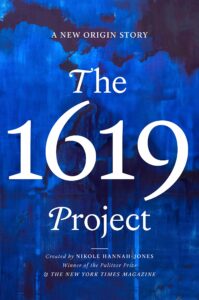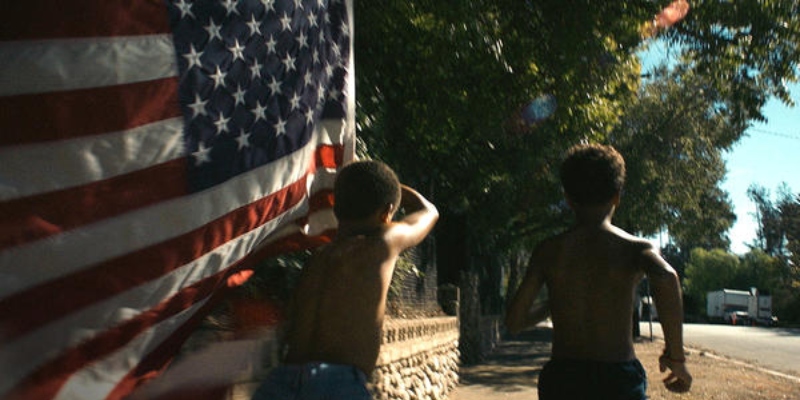The following is excerpted from Nikole Hannah-Jones’s preface to The 1619 Project: A New Origin Story. The 1619 Project was originally launched at The New York Times Magazine in August 2019, the 400th anniversary of the beginning of American slavery. Below, Hannah-Jones tells the story of the fights—among historians and politicians—that the project provoked, including the challenges it faced in schools and President Donald Trump’s hastily convened 1776 Commission, which President Joe Biden rescinded by executive order on his first day in office.
The 1619 Project, a six-part docuseries based on the book, is streaming now on Hulu.
*
As the reach of the 1619 Project grew, so did the backlash. A small group of historians publicly attempted to discredit the project by challenging its historical interpretations and pointing to what they said were historical errors. They did not agree with our framing, which treated slavery and anti-Blackness as foundational to America. They did not like our assertion that Black Americans have served as this nation’s most ardent freedom fighters and have waged their battles mostly alone, or the idea that so much of modern American life has been shaped not by the majestic ideals of our founding but by its grave hypocrisy. And they especially did not like a paragraph I wrote about the motivations of the colonists who declared independence from Britain.
“Conveniently left out of our founding mythology,” that paragraph began, “is the fact that one of the primary reasons the colonists decided to declare their independence from Britain was because they wanted to protect the institution of slavery.” Later, in response to other scholars who believed we hadn’t been specific enough and to clarify that this sentence had never been meant to imply that every single colonist shared this motivation, we changed the sentence to read “some of the colonists.” But that mattered little to some of our critics. The linking of slavery and the American Revolution directly challenged the cornerstone of national identity embedded in our public history, the narratives taught to us in elementary schools, museums and memorials, Hollywood movies, and in many scholarly works as well.
In truth, most of the fights over the 1619 Project were never really about the facts.
The assertions about the role slavery played in the American Revolution shocked many of our readers. But these assertions came directly from academic historians who had been making this argument for decades. Plainly, the historical ideas and arguments in the 1619 Project were not new. We based them on the wealth of scholarship that has redefined the field of American history since at least the 1960s, including Benjamin Quarles’s landmark book The Negro in the American Revolution, first published in 1961; Eric Foner’s Reconstruction: America’s Unfinished Revolution, 1863–1877; Annette GordonReed’s The Hemingses of Monticello: An American Family; and Alan Taylor’s The Internal Enemy: Slavery and War in Virginia, 1772–1832. What seemed to provoke so much ire was that we had breached the wall between academic history and popular understanding, and we had done so in The New York Times, the paper of record, in a major multimedia project led by a Black woman.
The project came under intense scrutiny, as should any major work that seeks to disrupt conventional narratives. Those outside the academy tend to think of history as settled, as a simple recounting of what events happened on what date and who was involved in those incidents. But while history is what happened, it is also, just as important, how we think about what happened and what we unearth and choose to remember about what happened. Historians gather at conferences, present research, and argue, debate, and quibble over interpretations of fact and emphasis all the time. Scholars regularly publish articles that analyze, question, or disagree with the respected and peer reviewed work of their colleagues.
As Mary Ellen Hicks, a historian and Black studies scholar, wrote in a Twitter thread, “The discussions about the 1619 project … have made me realize that historians may have missed an opportunity to demystify the production of scholarly knowledge for the public. The unsexy answer is that we produce constantly evolving interpretations, not facts.” Hicks explained that historians can look at the same set of facts— President Lincoln’s public remarks on colonization, for example—and come to different conclusions about whether his speeches reflected his personal views on repatriating Black Americans outside the United States or that he was simply engaging in a political strategy to avoid scaring away white moderates who opposed both slavery and Black citizenship. “The reality is,” she wrote, “a valid interpretation could come down on both sides of the issue.”
But some who opposed the 1619 Project treated a few scholars’ disagreements with certain claims and arguments as justification to dismiss the entire work as factually inaccurate, even as other equally prominent scholars defended and confirmed our facts and interpretations.
But while history is what happened, it is also, just as important, how we think about what happened.
In truth, most of the fights over the 1619 Project were never really about the facts. The Princeton historian Allen C. Guelzo, a particularly acerbic critic, published several articles that denounced the 1619 Project for treating “slavery not as a blemish that the Founders grudgingly tolerated … not as a regrettable chapter in the distant past, but as a living, breathing pattern upon which all American social life is based.” Guelzo then made clear that the source of his antipathy was not just what the project was saying but who was saying it: “It is the bitterest of ironies that the 1619 Project dispenses this malediction from the chair of ultimate cultural privilege in America, because in no human society has an enslaved people suddenly found itself vaulted into positions of such privilege, and with the consent—even the approbation—of those who were once the enslavers.”
In the months after the project was published, the opposition went from broadsides from critics to government attempts to prevent the project from being taught in schools and universities. In July 2020, a prominent US senator, Tom Cotton, introduced a bill called the “Saving American History Act,” which sought to strip federal funding from public schools teaching the 1619 Project. More than a dozen Republican legislatures have introduced similar bills, including in my home state of Iowa and my dad’s home state of Mississippi. (Both of those bills failed; the Cotton bill went nowhere.)
In September 2020, after a summer that saw the largest protest movement for racial justice in our country’s history, President Trump, who’d railed against the 1619 Project, used an executive order to hastily convene what he called the 1776 Commission. This group spent weeks assembling its report, which Trump released as one of the last acts of his presidency, on Martin Luther King Day. Written without input from any scholars who specialize in American history, it sought to reinforce the exceptional nature of our country, and to put forth a “patriotic” narrative that downplays racism and inequality and emphasizes a unity predicated on seeing slavery, segregation, and ongoing racial injustice as aberrations in a fundamentally just and exceptionally free nation.
The commission faced wide condemnation, with 47 groups representing academic historians signing a statement drawn up by the American Historical Association that accused the commission of issuing a report “written hastily in one month after two desultory and tendentious ‘hearings,’ without any consultation with professional historians of the United States” and failing “to engage a rich and vibrant body of scholarship that has evolved over the last seven decades.” President Joe Biden rescinded the executive order in one of his first acts in office. But by July 2021, regulations enforcing the ideology of the 1776 Commission and/or seeking to ban the teaching of the 1619 Project and teaching about racism had either been enacted or were being considered in 18 states. But Republican legislators in Texas introduced the 1836 Project, named after the year Texas declared independence from Mexico in order to found a slaveholding republic. That project seeks to establish a “patriotic education” in public schools. In other words, many people want laws passed that would ensure that students continue to learn the version of American history that American children have always been taught.
What these bills make clear is that the fights over the 1619 Project, like most fights over history, at their essence are about power. “Why would we expect the nation’s power structure even to acknowledge, much less come to terms with, such a dark and formative chapter in our collective family history?” the renowned historian Peter H. Wood wrote in a 1999 paper on slavery and denial. “After all, as several eminent academics have recently reminded us, ‘nations need to control national memory, because nations keep their shape by shaping their citizens’ understanding of the past.’”
As Frederick Douglass wrote in his 1892 autobiography, “The story of the master never wanted for narrators. The masters, to tell their story, had at call all the talent and genius that wealth and influence could command. They have had their full day in court. Literature, theology, philosophy, law and learning have come willingly to their service, and if condemned, they have not been condemned unheard.” Our part, as Douglass said, “has been to tell the story of the slave.”
_____________________________

Excerpted from THE 1619 PROJECT copyright © 2021 by The New York Times Company. Used by permission of One World, an imprint of Random House, a division of Penguin Random House LLC, New York. All rights reserved. No part of this excerpt may be reproduced or reprinted without permission in writing from the publisher.
